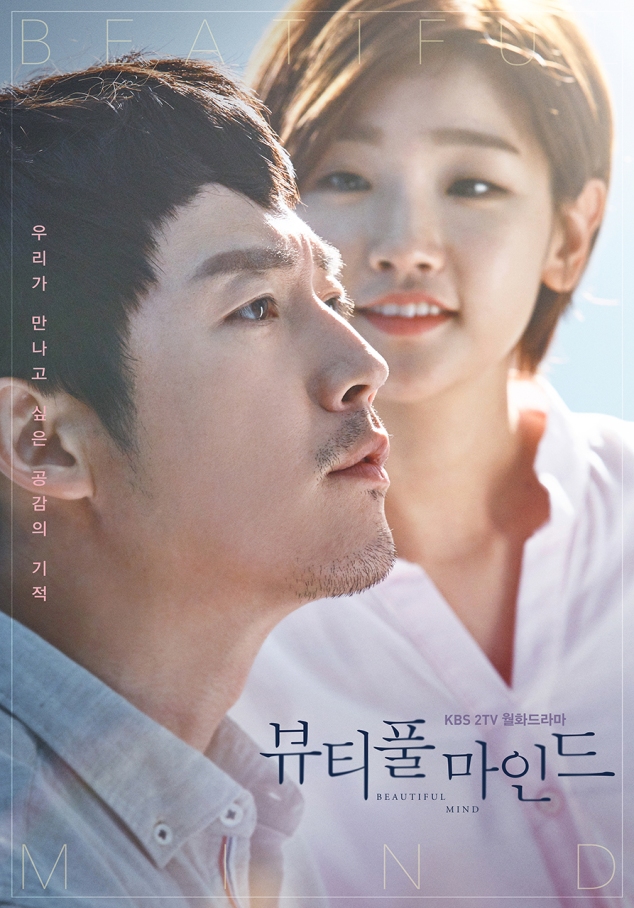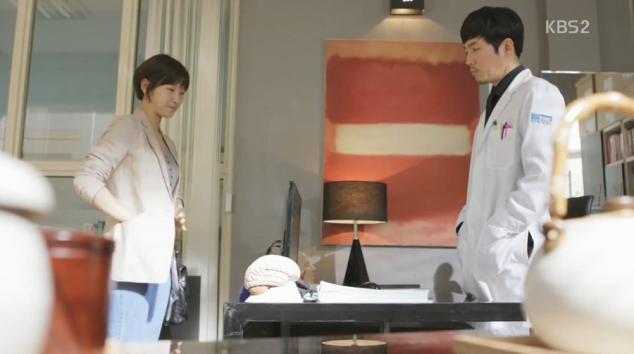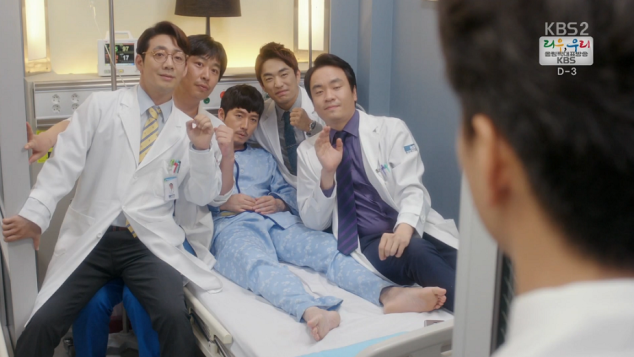Forging human connections is like running a makeshift theater academy. At times, a man briefly stages in his head the turmoil ravaging another person’s mind. At times, he recalls and mentally rehearses scenes that have brought someone in those shoes a little cheer. Then he walks onto a visible stage, located wherever the other party can be reached, and re-enacts the soothing gestures that show he understands. The title of the script is “Empathy,” but are fleeting plays all we deserve in our very real lives?
Loosely based on Mary Shelley’s novel Frankenstein, medical thriller Beautiful Mind charts the tragic struggles and heartening growth of a brilliant neurosurgeon supposedly incapable of naturally identifying and empathizing with people’s emotions since childhood days because of his own brain defects. His ordinary-sounding name, Lee Young-oh, is actually a homonym of his order of arrival as an abandoned child at his orphanage: 205. His adoptive father, also a neurosurgeon, is the God-playing Victor Frankenstein who thinks of himself as converting scum to human by suppressing Young-oh’s impulses through medication and meticulously employing visual aids to teach him the exterior signs of emotions. He drills into him, as well, the mission to live like a normal person—crying and laughing as everyone else does—and never let others discover his abnormalities.
What the audience can see through Young-oh’s lens, however, as he makes his way in the wild socioemotional universe of regular humans using those prostheses is that biologically normal people are frequently engaged in endeavors similar to his: imitating dream versions of themselves while hiding (knowingly or unknowingly) personal weaknesses. That might be less of an issue if everyone truly meant to be his better self. Unfortunately, the desire to see yourself or have yourself seen in a certain light is not quite the same as the desire to consistently think and behave in the associated manner. Ordinary folks, Young-oh concludes, often with razor-sharp observations aided by his encyclopedic knowledge of telltale microexpressions and self-betraying postures, make grandiose claims about unconditional love before the limits of their devotion have been really tested, despair more about face than their professed goals, and shower concern on those in need to bask in their own superiority. The concept of empathy itself is problematic as well, because nobody, he notes, can truly feel or comprehend another person’s exact emotions. However, whereas he at least possesses a mind honest to itself, their efforts at emulation sometimes reinforce indulgent self-deception.
The show does note that even if empathy cannot be practiced perfectly, helpful speculation is still possible. All the same, the coldblooded murders, betrayals and name-calling Young-oh’s abled colleagues engage in underscore how ineffectual this empathic ability can be even where the simulated and actual feelings would likely be close enough for the purpose at hand. To begin with, the decision maker must first have the will to attempt such simulation. Paradoxically, this will may arise less readily if he and the other party do not already happen to act like each other (i.e. share certain types of interests, experiences, affiliations, etc.). Raising the example of a Holocaust organizer who felt terrible about the sufferings of captured Jews but did not stop the exterminations, German-born American political thinker Hannah Arendt also observed that compassion does not guarantee action. It can be pointed out, too, that a duplicated emotion is ultimately not a living being with agency, but the decision maker’s own sensation, which he can cope with by means that do not improve the other person’s welfare (e.g. hurrying through a horrendous act). Principles, Arendt argued, are what truly secure rightful behavior.
Insofar as Young-oh’s prostheses mimic the mindreading capabilities of non-pathological brains, they and his obsession with proving himself to be a perfect, “normal” surgeon empower him to be a far more competent healer than his unprincipled colleagues. His self-confidence is shattered, however, when he realizes that surface emotions are not all there is to the emotional lives of others. Love, for instance, involves a variety of perceptible emotions but is not any of them. Emotions can be born out of a unique web of complex values, associated memories and intricate reasoning. Without this understanding, it is easy to assume, at worst, that a particular emotion in an observed person is a simple reaction to some stimulus you see, or at best, that it arises from a thinking process you or people you know would have engaged in. In the latter scenario, the simulation of the person’s emotions is really a simulation of your own or third parties’ potential emotions. This takes a devastating turn in the drama when Young-oh surmises that one critically ill patient’s fearful expression signals fear of the wife turning down treatment on his behalf when the object of his fear may have been none other than the painful prolongation of life Young-oh proceeds to force on him through heroic medical effort. Despondent, she ends his life with her own hands. It follows, then, that empathy cannot be a mere aping of visible emotional states. To attain a better understanding of someone, there is probably no better tool than direct interrogation.
Yet sometimes people insist that we probe not and ask not. To trace the contours of someone’s mind is to strip him bare and subject him to potential judgment he cannot always trust or control. Complete empathy contradicts also the need for space to be alone with one’s inner reality. By contrast, Young-oh’s emotional handicaps turn into assets when his diagnosis becomes public knowledge and his self-declared disinterest in others’ emotions and thoughts allows the female lead to cry freely in spite of his presence. It is actually an inaccurate representation of himself, because he is clearly concerned with her need for privacy, the understanding of which is surely an integral aspect of empathy. Here, it should be cautioned that empathic regard for privacy may become an excuse for either callous indifference or fear of burden. On the flip side, though, indiscriminate “empathy” practiced without heed to the wishes of the individual affected and potential outcomes can just as suspiciously resemble idle curiosity and, again, superficial moral credentialing. This dilemma requires that we turn to objective considerations to justify the type of empathy to opt for, including the practicality of gauging the person’s opinion, cognitive state under which he expresses his wishes and any danger posed by his predicament. There is, perhaps, no one-size-fits-all treatment which can be cloned from one person to another.
Given the difficulty of grasping and conveying intentions, it is unsurprising that much of human bonding takes place through ritualized behavior widely accepted as gestures of good will—holding the door open for those behind you, celebratory dinners, standard expressions of condolences, etc. The problem is, when a mode of conduct is so familiar that we take it for granted, there is the risk of losing sight of its rationale and sentiments those engaged in it are supposed to feel. Yet, as Young-oh finds out when his fiancée, devastated that he dates her only to meet the standard of being normal, backstabs him, what those we interact with frequently need is not soulless imitation, but genuine affection and friendship.
More heartbreak awaits when father and son discover that the brain abnormalities are misdiagnosed defects that have turned real by now as a result of the harsh parenting regimen, which denigrates Young-oh’s inner worth and forbids him to trust and tap into his emotional reserves. It seems reasonable to say that Young-oh’s schooling has taken place on two levels: on the surface, he understudies the role of a high-functioning social being, copying the moods and life choices of abled people around him; on the inside, he understudies the character of a deformed creature, since each necessary imitation hammers in the idea that his intrinsic nature is woefully inadequate and despicable. In the real world, similar maldevelopment has been observed in the prefrontal cortices of victims of childhood emotional abuse but, strictly speaking, the medical realism of the plot twist is probably unknowable without specific epidemiological studies of misinformed rehabilitation efforts. Still, it is a reminder that child-rearing should not be solely about fitting social molds. While discipline and knowledge of societal mores are highly important, such mores are not automatically exempt from critical scrutiny. Within each child, there may be innate goodness which value the world at large has yet to be cognizant of or uphold in an established format. Hollowing out a young person’s inborn personality and replacing it with that of some standard biopsychosocial being must not be the default practice of education.
One last instance of role-playing behavior cannot be forgotten in this analysis: the media engagement experience. Fiction consumption is a curious affair whereby readers and viewers busy themselves with the emotional worlds of often non-existent beings. In Beautiful Mind, that would involve gazing side by side with Young-oh at a couple with their newborn like children before a candy store, wondering when he may feel such commonplace happiness; sinking into hopelessness together as he allows a hopeful father-to-be to die before his eyes, unable to tell how genuine the man’s last-minute plea to halt medical intervention is; then lightening up as he does when he cradles his child on his behalf. The make-believe quality of these sensations does not ruin their beauty, but the actual experiences of individuals with neurological disorders potentially do. Away from the innocuous and even seductive universe of storytelling, the same viewers who wept with Young-oh may feel only contempt, mixed with anxiety for personal security, for a flesh-and-blood person with a brain deformity linked to criminality. Some might even knock a psychopath down a peg or two first to gain an early foothold in some (possibly one-sided) pride war! When this happens, empathy evoked by media narratives is but a feel-good commodity exploiting the plights of real-life disease sufferers.
All in all, while emotions frequently guide and motivate ethical behavior, they can also lull us into complacency, secure in the knowledge that we are human enough to be capable of feeling happy and sorry for people. Conversely, although Young-oh has no compunction playing devious tricks to achieve his ends, his keen awareness of his emotional deficiencies eventually spurs him to work harder than many others to support those under his care. Part of this effort comes from the pursuit of immaculate logic unclouded by passion or fear. Part of it is embodied by the immersive Mark Rothko color-block artwork, White Center (1957), occupying the background of his office: a layer-by-layer, close-up exploration of raw elements of the human psyche and metaphysical truths (life, death and the transcendental) which cannot be readily distilled by replicating real-life scenes. To Rothko, such compositions of large fuzzy-edged rectangles unlike anything in physical reality directly speak for the essence of “human drama.”








Love this piece! I feel very unintellectual at the moment to attempt a response, haha. But this is such a thoughtful, analytical piece of the various issues in Beautiful Mind and is a wonderful read. I wish I could tap into all these ideas and theories as expertly as you do, and I’m so glad you liked and enjoyed Beautiful Mind enough to write this.
Thanks! It certainly helped that it’s an inspiring drama. Brainstorming, researching and writing this post took seven weeks. Looking forward to your thoughts on the last two episodes on your blog!
Haha, umm… I’m rather embarrassed to post mine cuz it’s just a jumble of thoughts and nothing on the level of yours. I can totally see the effort you put in and appreciate it! I really like that you touched on the viewer engagement aspect and how it actually translates into real life, because as unfortunate as it is, it is also true of the general experience when coming into contact with someone (far) removed from society’s ideal of “normal”.
Special thanks to the following bloggers and readers for their expression of support in the prelude to this post: Kay
Kay junny
junny colorpencil2014
colorpencil2014 Cindy Knoke
Cindy Knoke Mitta
Mitta Lady Nyo
Lady Nyo Paula Vandeveer
Paula Vandeveer patriciaphillips55
patriciaphillips55
–
–
–
–
–
–
–
–
– Twitter users haviş and soomaya
– Tumblr bloggers chelleshawol and caseroan
After reading this I felt like my brain went to a spa and got a massage that was both soothing and energizing. Lol I guess in my cheesy way I’m trying to say, this was an excellent piece. Thank you for writing it!
Thank you for your compliment 🙂 Someday it may deliver the cardiac massage I need to carry on working on a new project!
A thoughtful and thought-provoking piece… ditto to the above comments 🙂 ♥ ❤
Helloooo, Jackie!!! It’s been a long time 😀
Thanks for missing me 😘 My blog’s sudden growth spurt has been keeping me ‘n my iPad on our blog hopping toes! 🙂🙃 It’s always good to hop over to your place for a dose of deep thought, though! 🤓 Thanks for all your visits, too 🙋💕❣:) ♥ ❤
[Moderated by Admin]
“No matter what you say, I hear it as ‘I love you’.” (Beautiful Mind, E13)
Wow, congratulations!! More knitting lovers, and more awareness about hypophosphatasia! ❤ This site had a tremendous spurt in traffic too after the release of this post. 😊
If only real-world drama does not reduce the time for dissecting television dramas!
Thanks and congrats on your spurt, as well! 🙂 May your blogful viewership continue to grow! Real-world drama appears to be on the rise, unfortunately My blog seems to be attracting new non-knitting subscribers, actually… But it’s always good to see when someone clicks on one of my HPP posts! 🙂 ♥ ❤
My blog seems to be attracting new non-knitting subscribers, actually… But it’s always good to see when someone clicks on one of my HPP posts! 🙂 ♥ ❤